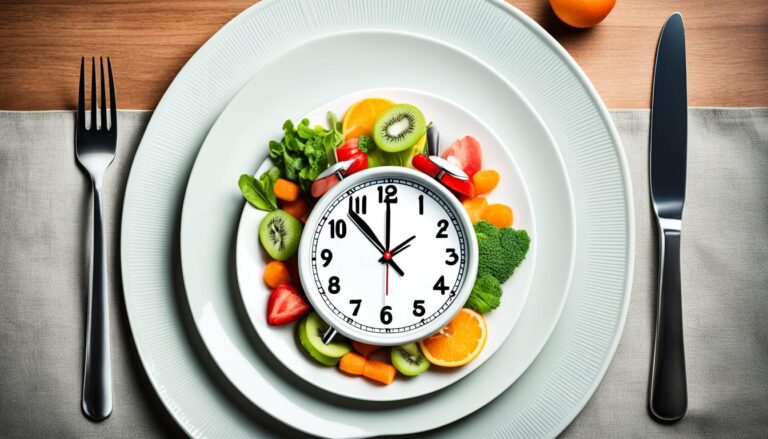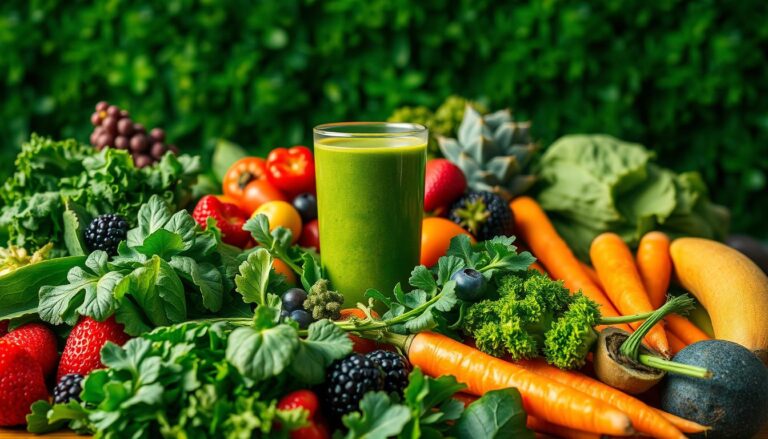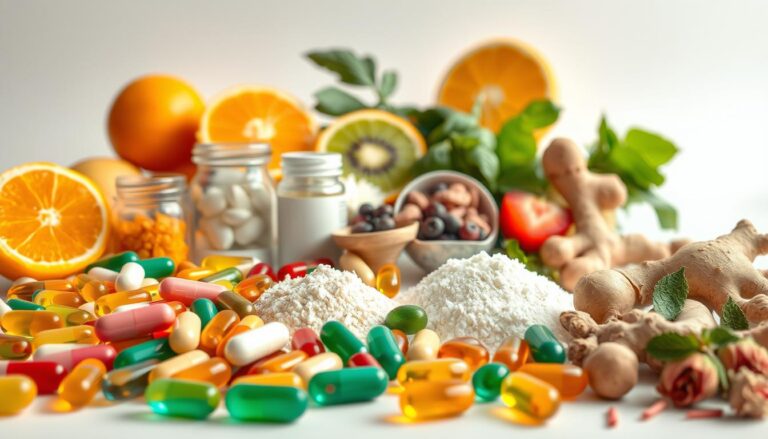Can your diet really affect your risk of developing cancer? The answer may surprise you. Research shows that the foods you eat daily can greatly impact your cancer risk.
So what dietary factors can affect cancer risk, and how can you make simple changes to lower your risk?
Key Takeaways
- Eating a diet rich in plant-based foods like vegetables fruits, whole grains, and beans can help lower cancer risk.
- Antioxidants and beneficial compounds in these plant-based foods can protect cells from damage and inflammation which are linked to cancer.
- Limiting processed and red meats, sugary foods, and alcohol can also play a role in cancer prevention.
- Making gradual, sustainable changes to your diet by focusing on more nutrient-dense, plant-based options is an important step in cancer risk reduction.
- Maintaining a healthy weight through a balanced, plant-based diet and regular physical activity can further contribute to lower cancer risk.
The Connection Between Diet and Cancer Risk
Many studies have looked into how our diet affects cancer risk. Some foods can increase or decrease the chance of getting cancer.
How Your Diet Affects Cancer Risk
Eating a lot of processed and red meats, sugary foods, and alcohol raises cancer risk. This includes cancers like colorectal, breast, and esophageal. These foods can have harmful compounds or lead to obesity, a big cancer risk factor.
But, eating more plant-based foods like vegetables, fruits, whole grains, and beans can lower cancer risk. These foods are full of antioxidants, fiber, and other good nutrients. They help protect cells from damage and inflammation, which can lower cancer risk.
| Cancer-Causing Foods | Cancer Fighting Foods |
|---|---|
| Processed meat | Vegetables |
| Red meat | Fruits |
| Sugary foods | Whole grains |
| Alcohol | Beans |
Timothy Rebbeck, a panelist, said
Alcohol is considered a carcinogen, with potentially no safe level of consumption in terms of cancer risk.
Diets full of sugar, refined carbs, and processed foods can cause chronic inflammation. This can increase cancer risk. On the other hand, a cancer-preventive diet rich in antioxidants, fiber, and other nutrients can lower cancer risk.

The Importance of a Plant Based Diet
A plant-based diet is key to lowering cancer risk. Studies show that eating more fruits, vegetables whole grains, and legumes is beneficial. These foods are full of antioxidants fiber, and phytochemicals which help fight cancer.
Plant-based diets can lower the risk of colorectal, breast, and prostate cancer. These foods protect cells, reduce inflammation, and boost the immune system. All these are important in fighting cancer.
You don’t need to be vegan or vegetarian to benefit. Just eating more plant-based foods can help. These foods are rich in nutrients that support cancer prevention.
Eating a diet rich in a variety of plant-based foods is one of the best ways to reduce your cancer risk.
So adding more plant-based foods to your diet is a smart move. It’s good for your body and long term health.
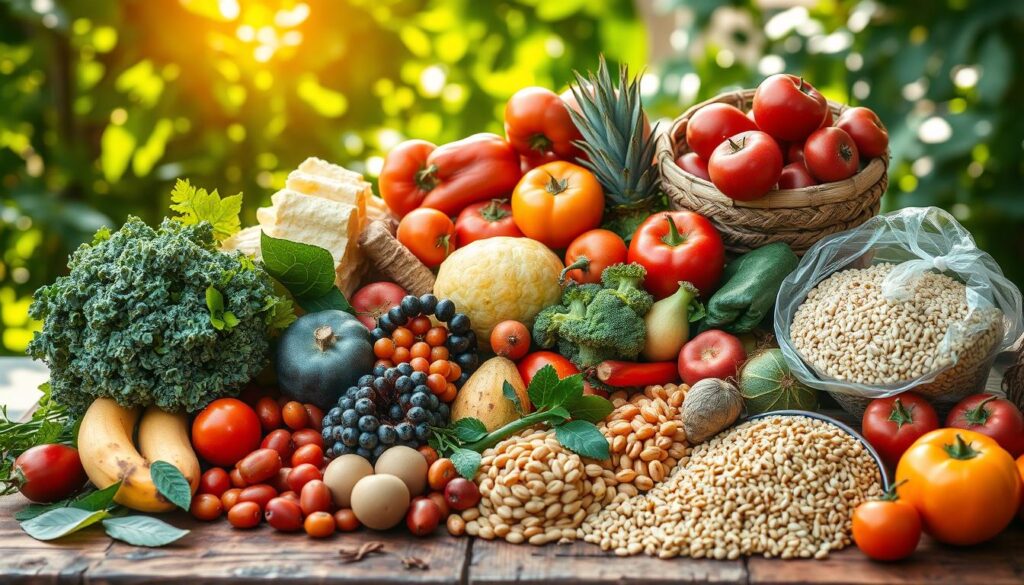
The Role of Antioxidants in Cancer Prevention
The Power of Antioxidants
Antioxidants are found in foods like vegetables, fruits, whole grains, and beans. They are key in fighting cancer by stopping free radicals and lowering oxidative stress. This stress can harm cells and lead to cancer.
Antioxidants or phytochemicals help fix cells remove toxins, and boost the immune system.
Eating foods rich in antioxidants can lower cancer risk. This includes lung prostate, and breast cancer. Eating a variety of colorful nutrient-rich plant based foods ensures you get many antioxidants. These work together to protect your cells and lower cancer risk.
| Antioxidant Rich Foods | Cancer-Preventive Properties |
|---|---|
| Berries blueberries raspberries, strawberries | Rich in anthocyanins which have been shown to inhibit tumor growth and prevent DNA damage. |
| Leafy greens kale, spinach, collards | High in carotenoids like lutein and zeaxanthin, which can reduce oxidative stress and inflammation. |
| Citrus fruits oranges, lemons, limes | Contain vitamin C and flavonoids that can enhance the immune system and protect against free radicals. |
| Tomatoes | Rich in the antioxidant lycopene, which has been linked to a reduced risk of prostate cancer. |
While studies on antioxidant supplements are mixed, eating a variety of antioxidant rich foods is still important. These foods help protect your cells and support your health. By eating these foods you can help keep your body healthy and strong.

How does diet reduce cancer risk?
Your diet is key to your cancer risk. Eating lots of fruits veggies, whole grains, and legumes can help a lot. These foods are full of good stuff like antioxidants, fiber, and phytochemicals. They help keep your cells safe and stop cancer from growing.
Antioxidants fight off free radicals and reduce inflammation. Both are big players in cancer. Fiber keeps your gut healthy, which is good for your immune system and cancer prevention. Phytochemicals can slow down or stop cancer cells from growing.
But eating too much processed meat, sugary foods, and alcohol can up your cancer risk. Processed meats like bacon and sausage can increase colorectal cancer risk by 20-50%. Even a little bit of processed meat daily can up your risk by 18%. Foods high in refined carbs can also raise prostate cancer risk.
Keeping a healthy weight is also important. Being overweight can increase cancer risk including for colorectal, breast, and endometrial cancer. Eating right and staying at a healthy weight can lower your cancer risk a lot.
Eating the optimal diet for cancer may reduce the risk by up to 70% and assist in recovery from cancer.
In short, eating more plant-based foods and less processed and sugary stuff can help lower your cancer risk. By choosing the right foods, you can help protect your health and well-being.
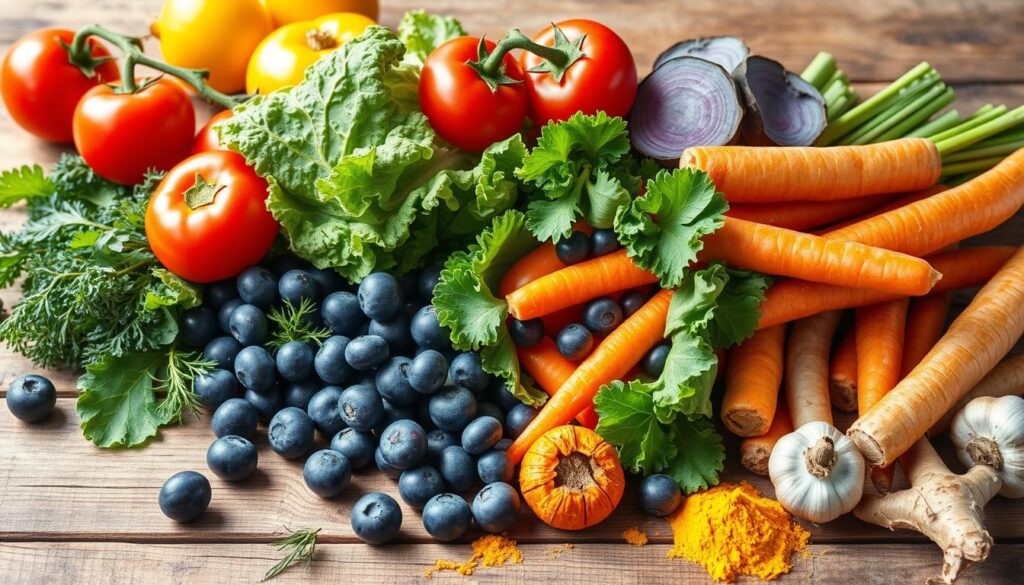
The Benefits of Fiber
Dietary fiber is key for a diet that fights cancer. Foods high in fiber like whole grains and fruits, help lower cancer risks. This includes cancers of the colon, breast, and prostate. Fiber slows down sugar absorption keeps the gut healthy, and helps maintain a good weight.
Studies show that eating fiber can lower death rates from all causes, heart disease, and cancer. The Institute of Medicine suggests that adults under 50 need 38 grams of fiber if male and 25 grams if female. For those 51 and older, the goal is 30 grams for men and 21 grams for women.
Incorporating Lean Proteins
Adding lean proteins to your diet also helps prevent cancer. Plant-based proteins like beans and tofu are good choices. They offer important nutrients without the risks of processed or red meats. Lean animal proteins, such as chicken and fish, are also okay in moderation.
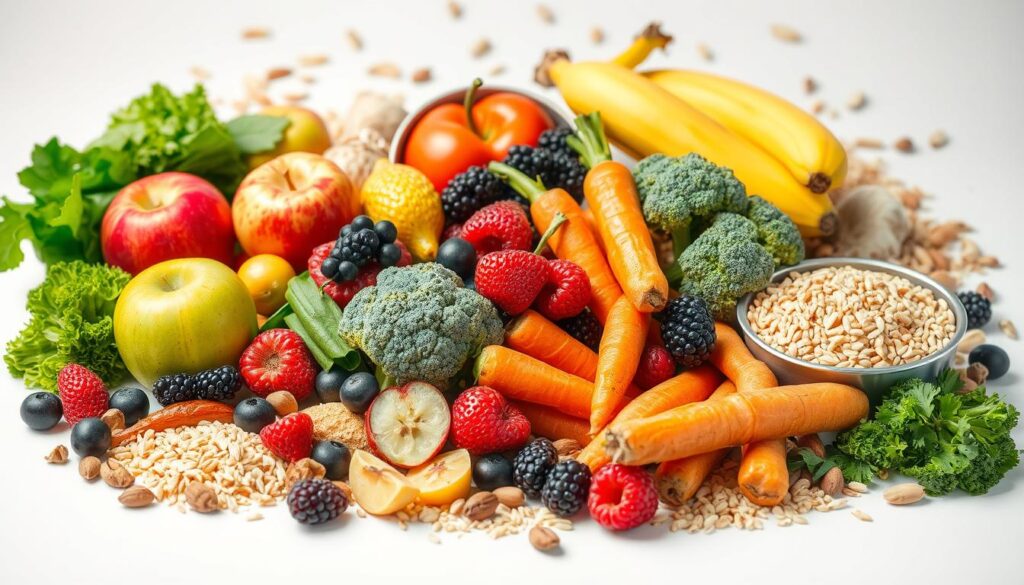
Increasing dietary fiber intake, especially cereal fiber, is associated with a reduced risk of dying from cardiovascular disease and all cancers.
The Role of Sugar and Artificial Sweeteners
Sugar, both added and refined, is linked to higher cancer risks. Diets full of added sugars and refined carbohydrates can lead to weight gain and obesity. These are big risks for cancer. Also refined sugars cause blood sugar to spike leading to inflammation and cell damage, which can cause cancer.
Natural sugars in fruits and veggies are okay. But, we should limit added and refined sugars to prevent cancer. The effect of artificial sweeteners on cancer is still being studied. Most studies show no clear link. Still it’s wise to cut down on both added sugars and artificial sweeteners for a healthy diet.
| Artificial Sweetener | Sweetness Compared to Sugar | Cancer Risk Findings |
|---|---|---|
| Saccharin | 200-700 times sweeter | No clear evidence linking to bladder cancer in humans |
| Aspartame | 200 times sweeter | Classified as possibly carcinogenic to humans in 2023 based on limited evidence of an association with liver cancer |
| Acesulfame Potassium | 200 times sweeter | Associated with a slightly higher risk of cancer in a cohort study |
| Sucralose | 600 times sweeter | Not found to cause cancer in humans |
| Neotame | 7,000-13,000 times sweeter | Not associated with cancer risk in humans |
| Advantame | 20,000 times sweeter | Not associated with cancer risk in humans |
Even though studies on artificial sweeteners and cancer are mixed, it’s smart to be careful. Eating plant-based foods, lean proteins, and fiber-rich foods can lower cancer risk. This helps keep you healthy overall.
Consumption of sugar-sweetened and artificially sweetened soft drinks is associated with a higher risk of cancers not related to obesity.
The Dangers of Alcohol Consumption
Drinking alcohol is linked to several cancers, like oral, throat, esophageal, colorectal, and liver cancer. Alcohol harms cells and causes inflammation, which can lead to cancer. Even a little drinking can raise cancer risks.
Studies show that 3.5% of cancer deaths in the United States about 19,500 deaths were due to alcohol in 2009. Drinking more can increase risks of head and neck cancers. For example, moderate drinkers face a 1.8-fold higher risk of oral and throat cancers, and heavy drinkers face a 5-fold higher risk.
Drinking any amount raises the risk of esophageal squamous cell carcinoma. The risk goes from 1.3-fold higher for light drinkers to nearly 5-fold higher for heavy drinkers. Heavy drinking also raises the risk of liver cancer by 2-fold.
Even a little alcohol can increase the risk of breast cancer. The risk goes up to 1.04-fold higher for light drinkers, 1.23-fold higher for moderate drinkers, and 1.6-fold higher for heavy drinkers. Drinking more also raises the risk of colorectal cancer by 1.2- to 1.5-fold.
To lower the risk of alcohol-related cancers, it’s best to avoid alcohol. If you do drink, women should limit themselves to no more than one drink per day, and men to no more than two drinks per day. Cutting down or quitting alcohol can help lower cancer risk.
The more alcohol consumed, the higher the risk for most types of cancer.
Making Healthy Diet Changes
Changing to a diet that helps prevent cancer doesn’t have to be hard. Start with small, lasting changes to improve your eating habits. This way, you can lower your cancer risk slowly but surely. It’s better to make changes little by little, rather than trying to change everything at once.
Tips for Gradually Transitioning to a Cancer Preventive Diet
- First, look at what you usually eat. See how much of it is from whole, plant-based foods versus processed and sugary foods. This helps you find easy swaps.
- Slowly add more fruits, vegetables, whole grains, and legumes to your diet. These foods are full of antioxidants and fiber that fight cancer.
- Switch from refined carbs like white bread and pasta to whole-grain versions. Whole grains give you more fiber and nutrients.
- Choose lean proteins like chicken, fish, or plant-based options like lentils and tofu instead of red and processed meats.
- Drink less sugary drinks and foods. Use natural sweeteners like honey or maple syrup sparingly.
- Drink less alcohol too, as it can increase cancer risk.
By making these small changes, you can make lasting changes to your diet. Remember, it’s about making progress, not being perfect. The goal is to stick to these changes for a long time.
The key is to focus on progress, not perfection, and implement small, realistic changes that you can stick to over the long term.
The Role of Body Weight in Cancer Risk
Keeping a healthy body weight is key to preventing cancer. Many studies link being overweight to higher cancer risks. This includes cancers of the colon breast uterus, and esophagus.
Being overweight can lead to chronic inflammation and hormonal imbalances. These factors are linked to cancer. In the U.S., being overweight causes about 11% of cancers in women and 5% in men. It also leads to 7% of all cancer deaths.
Healthy eating and exercise can lower cancer risk. Even a little weight loss helps. This shows how important a healthy lifestyle is for cancer prevention.
But, obesity and excess weight are big problems in the U.S. Over 1 in 3 adults are obese, and another 1 in 3 is overweight. Among kids and teens, about 20% are obese.
Being overweight raises the risk for many health issues. This includes heart disease, diabetes, and certain cancers. Multiple types of cancer are linked with excess body weight.
Staying at a healthy weight is a strong way to prevent cancer. Only 25% of adults in the United States are a healthy body weight. This shows we need to do more to tackle this public health issue.
Conclusion
A person’s diet is key to their cancer risk. Eating a plant-based diet with lots of veggies, fruits, whole grains, and lean proteins can lower cancer risk. Foods high in antioxidants, fiber, and less processed meats are good choices.
It’s also important to avoid too much sugar and alcohol. Keeping a healthy weight is crucial since being overweight increases cancer risk.
Making small, lasting changes in diet and lifestyle can help prevent cancer. This approach empowers people to improve their health and lower cancer risk. The research and statistics show how important a cancer-preventive diet is.
There’s no single solution, but a healthy lifestyle with a plant-based diet helps a lot. Focus on eating foods rich in fiber and antioxidants. Also, keep a healthy weight and limit harmful substances. This way, you can actively work towards preventing cancer.
